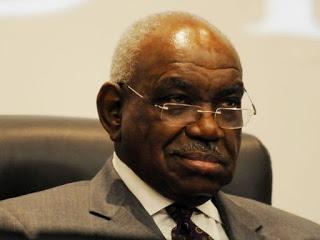
Jeff Sessions
(From cnn.com)
R. David Proctor's appearance in the case came during an episode that should add to the evidence that Sessions (and Proctor, for that matter) has backward and divisive views on race. Those views already have cost Sessions a federal judgeship in the 1980s. Could the latest information help torpedo Sessions's shot at confirmation as Donald Trump's nominee for U.S. attorney general? The Senate Judiciary Committee certainly should review them in depth -- and Sessions confirmation hearing begins tomorrow.
The new revelations grow from the same mid-1990s case -- USX Co. v. Tieco Inc. -- that prompted Jefferson County Judge James S. Garrett (now retired) to write that Sessions and his subordinates had engaged in the worst prosecutorial misconduct he had ever seen -- including failure to turn over exculpatory evidence, deceptive testimony, and "blatant disregard of the constitutional rights of those accused." (CNN broke that portion of the story in a piece dated December 22, 2016.)
That was from a criminal proceeding in USX v. Tieco, but the case also involved civil matters, mostly in federal court. That's where Sessions and Proctor apparently engaged in some race-based underhandedness.
We don't have access to the full record in the Tieco civil matter, but it appears Judge U.W. Clemon originally was assigned to the case. Clemon is a historic figure. He confronted infamous public-safety commissioner Bull Conner over Birmingham's segregation laws, marched with Martin Luther King, desegregated the Birmingham Public Library, and sued Paul "Bear" Bryant to desegregate the University of Alabama football team. He filed employment-discrimination lawsuits against some of the largest employers in Alabama.
In 1980, Jimmy Carter appointed Clemon to the bench in the Northern District of Alabama, making him the state's first black federal judge. Clemon had a history of, and a reputation for, seeking justice for victims of civil-rights violations. To white right-wingers like Sessions and Proctor, they probably considered Clemon to view their positions unfavorably.

U.W. Clemon
(From atlantablackstar.com)
At the time, a relatively new law firm had formed in Birmingham called Lehr Middlebrooks Price and Proctor. The last name in that lineup stood for R. David Proctor, now a federal judge handling our cases. The third name stood for Terry Price, who just happened to be Judge Clemon's nephew (the middle son of the judge's oldest sister).
Did Sessions and his chief investigator, Edward F. McFadden, hire Lehr Middlebrooks to defend them to create a conflict that would force Clemon off the case? The judge addressed that question in a memorandum opinion dated June 21, 1966:
On June 17, 1996, counsel for defendants filed a "Motion for Hearing Concerning Representation 1461*1461 of Counterclaim Defendants Pursuant to Robinson v. Boeing." This Court treats the document as a Motion To Disqualify the new Birmingham, Alabama law firm of Lehr, Middlebrooks, Price and Proctor — one of whose partners is this judge's nephew, Terry Price.
The motion raises the pregnant question of whether the disqualification of this judge was a motivating factor in the decision of counterclaim defendant Attorney General Jeff Sessions and his Chief Investigator to hire that law firm.
On yesterday, June 20, 1996, Terry Price entered his appearance for Jeff Sessions, Attorney General of the State of Alabama; and for Edward F. McFadden, Chief Investigator for the Office of the Attorney General of the State of Alabama.
Section 455(b)(5)(ii) of the United States Judicial Code (Title 28) requires a judge to disqualify himself if a person within the third degree of relationship to him is acting as a lawyer in the proceeding. Terry Price, being the middle son of the oldest sister of this judge, falls into that category.
An opinion from the Fifth Circuit said a judge should be on the lookout for those who might seek to use Sec. 455 in an abusive fashion. From Clemon's opinion on that subject:
As the Fifth Circuit has observed and held:
".... If after seeing who the judge is or weighing his rulings for a period of years, a litigant could in effect veto the [assignment] and obtain a new judge by the simple expedient of finding one of the judge's relatives who is willing to act as counsel, it would become possible for any party to disrupt preparation for, or, indeed, the trial itself. The drafters of § 455 warned that `each judge must be alert to avoid the possibility that those who would seek his disqualification are in fact seeking to avoid the consequences of his expected adverse decision. . . . In light of Congress' intent and the needs of judicial efficiency, we hold that counsel may not be chosen solely or primarily for the purpose of disqualifying the judge. The district court threatened with such maneuvers need not confine itself to grievance proceedings against errant counsel. `A motion to disqualify counsel is a proper method for a party-litigant to bring the issue of conflict of interest or a breach of ethical duties to the attention of the court.' [footnote omitted]. Indeed, `a District court is obliged to take measures against unethical conduct occurring in connection with any proceeding before it.'" Woods v. Covington County Bank, 537 F.2d 804, 810 (5th Cir.1976)
Notice the terms applied to those who would resort to such a scam to disqualify a judge -- "breach of ethical duties" and "unethical conduct." In the Tieco case, it appears those terms could be affixed to Jeff Sessions, now nominated as U.S. attorney general, and R. David Proctor, now a federal judge hearing our two cases.
Did the Sessions/Proctor scheme work? The answer appears to be yes, at least in part. From Clemon's memorandum opinion:
Since this judge is automatically precluded from hearing the Motion to Disqualify the law firm chosen by the Attorney General and his Chief Investigator, consistent with Robinson v. Boeing, 79 F.3d 1053 (11th Cir.1996), the motion is hereby referred to the Clerk of this Court for reassignment to another judge of the Court consistent with the routine practices of the Court.[2] In the meanwhile, this judge shall proceed no further.
Based on those words, it appears Clemon stepped down and did not return to the case. If so, did the cheaters (Sessions and Proctor) win? That's how it looks from here. These headlines from the time period suggest the same thing:
* "A Company Suing Attorney General Jeff Sessions Has Accused Him Of Hiring The Nephew Of A Birmingham Federal Judge In Order To Make The Judge Step Down From The Case." [Associated Press, 6/20/96]
* “Tieco Inc., Which Sued [Jeff] Sessions On A Civil Rights Violation Claim, Has Asked That Another Judge Review The Matter To See If U.S. District Judge U.W. Clemon’s Nephew, Terry Price, Was Hired By Sessions To Get Clemon Off The Case.” [Associated Press, 6/20/96]
* "Lawyer That Represented A Company That Sued Jeff Sessions: Sessions’ Hire Of Judge U.W. Clemon’s Nephew To Represent The Attorney General “Appears To Be A Tactical Move To Disqualify Judge Clemon From A Civil Rights Case.” [Associated Press, 6/20/96]
* "A Company That Sued Jeff Sessions Claimed A Law Firm Hired To Represent The Attorney General In A Civil Rights Case Specialized In “Labor Law And [Had] No Special History Of Defending Civil Rights Cases Or The Attorney General” [Associated Press, 6/20/96]
That last headline is particularly disarming, indicating that Attorney Terry Price had no expertise in matters present in the Tieco case. Did his main area of "expertise" consist of being Judge Clemon's nephew? Is that all Jeff Sessions and R. David Proctor cared about?
If so, they engaged in clearly unethical conduct, under the law, and it should raise questions about their fitness to serve as U.S. attorney general and district judge.
